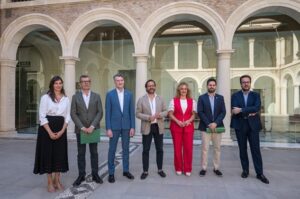More than 1,200 professionals involved in the study and management of diabetes gather from April 10th to 13th at the Granada Congress Center for the XXXV National Congress of the Spanish Society of Diabetes (SED). The congress will address, through various formats, the latest and most promising advances from basic research to the exposition and discussion of solutions for the classical clinical problems associated with the prevention, diagnosis, treatment, education, and monitoring of people with diabetes.
“This is the most important scientific meeting on diabetes held annually in Spain,” says Dr. Antonio Pérez Pérez, president of the SED. He emphasizes that “this forum allows professionals from different specialties and disciplines of health sciences related to diabetes to come together annually and discuss the main challenges and advances in this field.” Dr. María José Picón, 1st Vice President of the SED and Endocrinology and Nutrition specialist at the Virgen de la Victoria Hospital (Málaga), acknowledges that “it is a priority to generate synergies in different areas of this pathology, which is on the rise but is also experiencing spectacular advances in prevention, therapy, technology, immunology, and more.”
The congress theme (“Diabetes Connects Us, Exchanging Experiences”) reflects the transversality and multidisciplinary nature of diabetes. “The participation of all stakeholders (patients, healthcare professionals, and society) is fundamental for adequate treatment and improvement in the quality of life of people with diabetes,” says Dr. Pérez, who is the director of the Endocrinology and Nutrition Service at the Hospital de la Santa Creu i Sant Pau (Barcelona).
The scientific program consists of three keynote lectures (inaugural, closing, and plenary), three pre-congress courses, and two post-congress courses conducted by SED working groups, 10 blocks of oral communications, 13 roundtable discussions, and 8 expert encounters. The program also includes awards ceremonies and presentations of projects promoted by the SED.
The latest basic research in diabetes (joint session with CIBERDEM) will be showcased, and more than twenty roundtable discussions on current topics will be held: latest clinical trials, advances in type 1 diabetes treatment, different realities in the implementation of continuous glucose monitoring in type 2 diabetes, the link between muscle and diabetes, new care models in type 1 diabetes, or type 2 diabetes remission. The patient’s perspective will also be addressed, covering purely psychological and emotional aspects of people with diabetes.
Highlights
“The opening and closing lectures will reveal major breakthroughs with the potential to influence future diabetes management significantly. Sessions dedicated to new strategies or care models in type 1 and type 2 diabetes stand out due to their impact on the development of new management models for diabetes care within the National Health System,” highlights the president of the SED.
Dr. Pablo López-Ibarra, President of the Organizing Committee of this Congress, emphasizes the interest in several lectures discussing the “new expectations opened by the possibility of having for the first time a drug that delays the onset of type 1 diabetes (teplizumab)”; also, as noted by this expert working at the Endocrinology and Nutrition Service of the San Cecilio University Hospital (Granada), “it is of great importance to address purely psychological and emotional aspects of people with diabetes in a session with the suggestive title ‘Let’s talk about feelings in diabetes’.”
Prof. Colin Dayan from Cardiff University will summarize in the opening lecture an innovative approach to type 1 diabetes, more as an autoimmune disease than metabolic, analyzing the risks and benefits of treating it with immunotherapy instead of insulin. The closing lecture will be given by Dr. José María Mercader from the Broad Institute of MIT and Harvard University (Boston, USA), who will demonstrate the enormous possibilities offered by a more personalized approach to diabetes patients. Also noteworthy is the lecture by Prof. Jonatan Ruiz Ruiz from the University of Granada, who will discuss the impact of exercise on glucose regulation in people with diabetes.
Technological innovations also feature prominently in the scientific program, with two roundtable discussions focused on organizational and care aspects. “The emergence of technology in the management of patients with type 1 diabetes has been a reality in Spain for years, which has influenced changes in how we care for patients and invites us to reflect on new care models,” says Dr. Picón. On the other hand, she adds, “technology has also reached the population of people with type 2 diabetes, requiring analysis of the different realities in Spain regarding the implementation of technological innovations such as glucose sensors.”
In addition, the more than 300 communications presented at this Congress reflect the growing and increasingly important research on diabetes being conducted in Spain. “More than 70 reviewers have meticulously evaluated all these communications, selecting 50 of them for oral presentation,” explains the president of the Scientific Committee, who emphasizes that “the quality of the work has been truly admirable,” concludes Dr. Picón.
Diabetes in Andalusia, and a milestone for Granada
This gives even greater importance to the Congress, which, as stated by the President of the Organizing Committee, “will be the most important meeting on diabetes held in Granada in recent years.” In 2021, the SED also held its National Congress in this city, but it was virtual due to the pandemic. Organizational-wise, according to Dr. Pablo López-Ibarra, “it will be the longest-lasting of those the Society has held in its 70-year history, lasting almost 4 days.”
In Andalusia, slightly more than 15% of the population has diabetes (slightly higher than the national average), and almost half are unaware of it. However, as Dr. López-Ibarra points out, “the most important thing is not this ‘snapshot,’ but that the two fundamental forms of diabetes are experiencing growth: type 2 diabetes, with an epidemic dimension, and type 1 diabetes, steadily but continuously since the mid-twentieth century.”
In Andalusia, as stated by the expert from San Cecilio Hospital, “in the last two decades, we have greatly improved the care for people with diabetes at both care levels (diabetes education, screening for complications, application of new technologies, etc.), partly due to the existence of a comprehensive diabetes plan for years (PIDMA).” In fact, he says, “our services are comparable to those of any other autonomous community at present.”
For access to the scientific program: https://sedgranada2024.com




